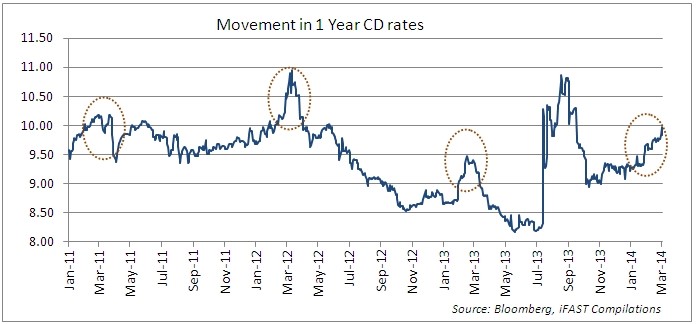Know why banking debt funds prove to be the ideal investment option for risk averse investors.
Every year in March, we see a few fund houses harping on Banking Debt Funds. By the time investors try to make sense about this noise in the market, fund houses go into a silent mode. However, this year we thought it appropriate to let our investors know what these funds are all about and why it makes sense for them to take an exposure into the same.
In a nutshell, these funds invest in 1 year Certificates of Deposit (CDs) which will mature next March and hence will let them take advantage of accruals and capital appreciation. The thought process behind this strategy is that it has been observed that the yields on 1 year CDs normally climb from the month of January and reaches its peak by March. This is because March is known to be the time when the economy is in a tight liquidity situation. This is on account of certain factors like advance tax flows, government’s resolve to maintain fiscal deficit which would be done either through the reduction in expenditure or by targeting disinvestments into PSUs, which would in turn put pressure on the banking system. The window dressing that the banks do in March would also put stress on the liquidity in the system. The chart below is a clear indication of the views that we have stated above.

Axis Banking Debt Fund
The fund launched on June 8, 2012 is being managed by Kedar Karnik since November 5, 2012. The fund’s mandate is to invest into debt and money market instruments issued by banks, treasury bills and government securities. The fund has clearly mandated that around 70% of the portfolio will be concentrated in AAA/A1+ securities. The fund will not have any allocations into below AA- or equivalent securities.
The fund will carry a rigorous evaluation of credit which will be a bottom up approach and will include factors like operating environment of the issuer, past track record, future prospects of the issuer and the short term/long term financial health of the issuer. An analysis of the fund from March 2013 shows that the maximum allocation of the surplus has been in bank CDs almost to the tune of 97% on an average. In line with the investment strategy, the fund always has the portfolio concentration in instruments which are rated A1+/AAA. This fund does not have a bias towards public sector banks or private sector banks. During March 2013-June 2013, the fund had a small exposure into corporate debt after which the fund stopped taking an allocation into the same. The portfolio allocation as on February 2014 shows that the maximum portion of the surplus is into CDs of banks like Corporation Bank, Oriental Bank of Commerce, Vijaya Bank, Indian Overseas Bank, IDBI Bank and ICICI Bank all of which are to the tune of 12% each. The average maturity of the fund which stood at 11.8 months in March 2013 was reduced to 1.3 months in January 2014. However, as on February 2014, the fund’s average maturity stands at 10.8 months.
IDFC Banking Debt Fund
The fund was launched on March 7, 2013 and is being managed by Anupam Joshi. A glance through the investment strategy shows that a substantial portion of the fund will be invested in money market instruments with the aim to generate stable returns with minimal risk. The investments will be mainly in debt & money market instruments issued by Scheduled Banks, Treasury Bills and Government Securities.
The fund seeks to invest at least 70% of the surplus into AAA/A1+ or equivalent papers and will not take any exposure into instruments which are rated below AA- or equivalent. An analysis of the portfolio over the last year shows that since the inception of the fund, on an average, around 99% of the portfolio is concentrated into bank CDs, all of which have been rated A1+. Till date, the fund has not shown any preference towards Private Sector Banks. As on February 2014, more than 40% of the portfolio has been allocated into the CDs of Central Bank of India and Bank of Maharashtra. Initially, when the fund was launched in March 2013, the fund had an average maturity of 12 months which has come down to less than a month as on February 2014. This is a clear indication that the fund will buy into next March maturing assets and the surplus will always be deployed in the March to March trade.
Our take
We are of the view that as these funds have their entire portfolio concentrated in bank CDs, they are satisfying the SLR criterion, i.e., safety, liquidity and returns. Hence our recommendation is that this is an ideal investment option for those investors who are risk averse and have a time horizon of one year.
The article was first published in www.fundsupermart.co.in on March 21, 2014.



